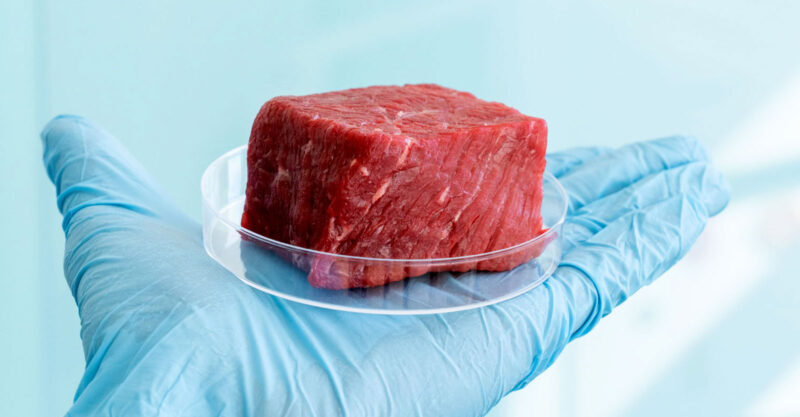by Dr. Joseph Mercola, Mercola:

Using strategies to position it as a healthy alternative for natural meat, the industry’s fake meat is just another name for ultra-processed food, full of GE and pesticide-laden ingredients designed to look as much like meat as possible.
TRUTH LIVES on at https://sgtreport.tv/
- Although the soy-like hemoglobin used in the Impossible Burger is classified as generally recognized as safe, no tests have been done by independent labs on the product’s safety. However, tests on lab rats altered the animals’ blood chemistry; the company did not follow up on the results.
- The parent companies for Impossible Burger and Beyond Burger commissioned studies to assess the environmental impact of production against typical concentrated animal feeding operation (CAFO) beef production. Not surprisingly, they found their product had a lower impact. But it’s not nearly as low as the beef production at White Oaks Pastures, which uses regenerative farming practices to produce natural beef products.
- If a plant-based, genetically engineered (GE) meat alternative is not enough of a science fiction adventure, consider the “meat” scientists are growing from stem cell cultures in the lab. Some see these alternatives as the lesser of two evils, but when holistic herd management improves the environment, your best choice is to seek food from natural sources.
The junk food industry has a new product they are offering in exchange for your health and finances.
Using strategies to position it as a healthy alternative for natural meat, the industry’s fake meat is just another name for ultra-processed food, full of GE and pesticide-laden ingredients designed to look as much like meat as possible.
In an effort to get you hooked on it, it’s marketed as healthier and better for the environment — which may lead you to believe you’re eating good food while protecting your local air and water supplies.
The manufacturers are so intent on mimicking foods found in nature that they’ve even genetically engineered “blood” for their fake meat products.
Food critics are divided on the taste, with some finding the texture pleasing, but not tasting like a burger. Others say that only when the burger is piled high with caramelized onions, vegan mayo and mashed avocado does the flavor likely approximate meat.
When it comes to organic offerings, food manufacturers would like you to believe they can improve on nature but, historically, this has been nearly impossible to achieve.
Ultra-processed foods have contributed to the obesity epidemic, rising rates of cardiovascular disease and an increased risk of all-cause mortality.
If you think ultra-processed foods are only found in the junk food aisle, though, it may surprise you to learn that, according to Current Developments in Nutrition, many foods you eat most likely include fake meat ingredients:
“Besides salt, sugar, oils, and fats, ingredients of ultra-processed foods include food substances not commonly used in culinary preparations, such as hydrolyzed protein, modified starches, and hydrogenated or interesterified oils.
“Additives whose purpose is to imitate sensorial qualities of unprocessed or minimally processed foods and their culinary preparations or to disguise undesirable qualities of the final product, such as colorants, flavorings, nonsugar sweeteners, emulsifiers, humectants, sequestrants, and firming, bulking, de-foaming, anticaking, and glazing agents.”
Health is not driving a meat makeover
The Heart and Stroke Foundation of Canada warns you should not be swayed by deceptive marketing tactics using words such as “healthy” and “natural” when you make food choices.
Unfortunately, it appears that some consumers believe the advertising promises.
While called a plant-based meat alternative, Beyond Burgers and Impossible Burgers are an ultra-processed conglomeration of chemicals, concocted by pulling protein from soy and a few other processed concentrates.
Amy Keating, registered dietitian and Consumer Reports nutritionist commented:
“… while its starting materials may be plants, the main ingredients are all highly processed concentrates, oils, and flavors. If you want the health benefits of plants, eat them as whole foods with their nutrients and fiber naturally present.”
Adding to the discussion, both Impossible Burger and Beyond Burger have nearly the same amount of total fat and calories as real beef burgers. In addition, both also have much more processed sodium added.
As a reporter at NBC News so succinctly pointed out:
“If eating more realistic fake meat was about health, the offerings would be far lower in salt content, contain fewer calories and have a bit less dietary fat. None of them do, because the point was never to live up to the marketing of healthier eating. It was to simply act as a smooth replacement for the meat we worried about eating in our day-to-day lives.”
The fake meat industry is riding the coattails of the real risk that CAFOs pose to the environment and to human health.
However, fake meat manufacturers have turned to the laboratory to boost profits and drive sales rather than support sustainable and environmentally-friendly real food production.
Chemical-packed fake meat contains GE blood



